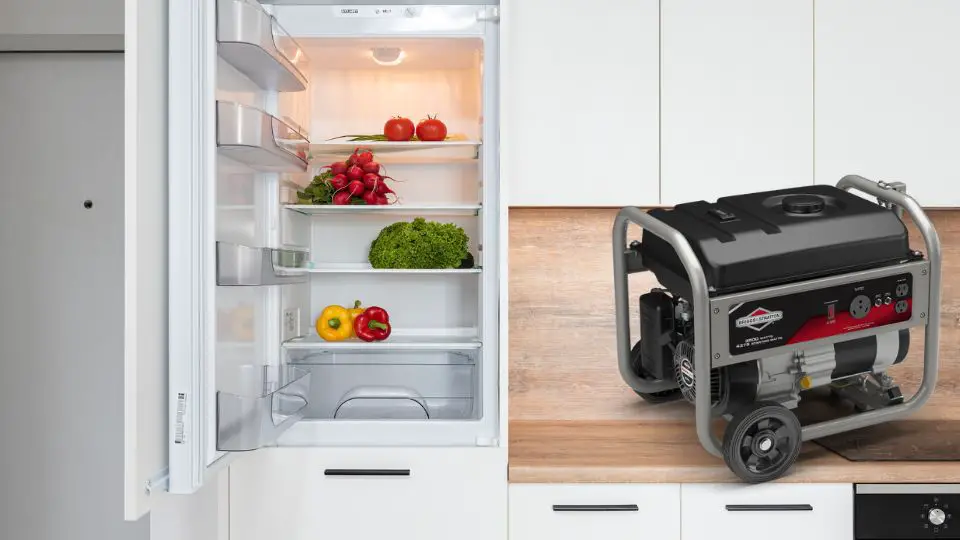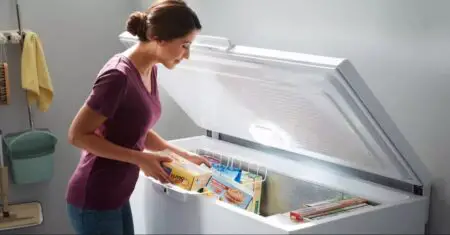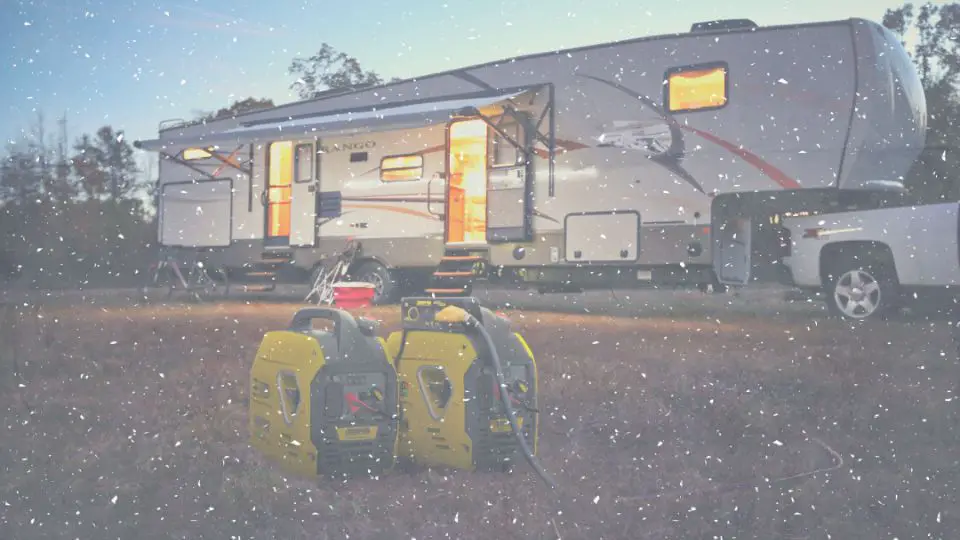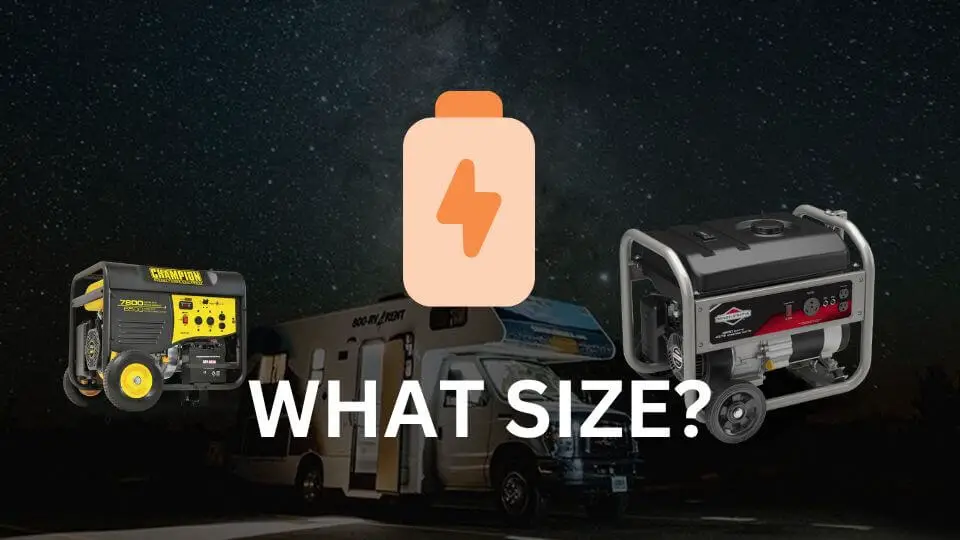This post may contain affiliate links. As an affiliate, we earn from qualifying purchases. We get commissions for purchases made through links in this post.
Using the correct size generator is important whether you need to power a fridge and freezer during extended power outages or you’re hosting an outdoor party and want to keep your drinks cold.
The size of the generator required to run a refrigerator with a freezer depends on several factors, including the starting and running wattage of mentioned appliances, as well as additional devices that you’re running from the same generator.
As a general rule of thumb, a 3,000 Watt generator should be sufficient to run a refrigerator and freezer simultaneously. However, some really big fridges will require a 5,000 Watt generator. In most life scenarios, though, you won’t be running such huge refrigerators.
How big of a generator do I need to run a refrigerator and freezer?
To determine the exact size of the generator required, you will need to check the wattage requirements of your refrigerator and freezer. This information is usually found on the label or in the owner’s manual. Once you know the starting and running Watts of your refrigerator plus a freezer, you can figure out the required generator size right away.
Most standard fridges will require not more than 700 Watts when running and 2,900 startup Watts. You will rarely have a fridge that needs more than that. Therefore, a 3,000 or 3,500W portable generator is going to suffice.
Will a 2000 Watt generator run a freezer?
Yes, but only those freezers that require no more than 2,000W startup power. Typically, small freezers would need 1,200 starting Watts and 400 running Watts. These types of freezers will run fine from a 2,000 Watt generator. You should check the label or owner’s manual of your freezer to determine its wattage requirements, including its starting power.
Will a 3500 Watt generator run a freezer?
Yes, a 3,500 Watt generator will be able to run a freezer. In general, most freezers have a running wattage between 300 and 800 Watts, while the starting wattage can be 2-3 times more.
A 3,500 Watt generator has enough capacity to handle a freezer with a starting wattage of up to 2,900W and a running wattage of up to 700 Watts, which is enough to power most household freezers.
However, this generator may not be able to run a big side-by-side fridge as the latter requires around 4,000 Watts of startup power.
It’s important to check the label or owner’s manual of your freezer to determine its exact power requirements, including its starting wattage, as some models may require more than usual power to start. It’s also important to note that running additional appliances at the same time as the freezer may require a larger generator.
Can a 4.5 kVA generator power a deep freezer?
Yes, a 4.5 kvA (or 4,500 Watts) portable generator can absolutely run most deep freezers on the market. A standard chest freezer runs on 300 Watts and requires 5 times more to start, which is 1,500W. With that in mind, it is obvious that a 4.5 kVA is capable to run up to 3 normal deep freezers. Be sure to account for any additional appliances that you feed from the same generator, as otherwise, you may overload it.
What size generator do I need for a deep freeze?
The size of the generator you need for a deep freeze depends on the wattage of the deep freeze and the starting Watts required to start the compressor. To determine the right size generator for your deep freeze, you’ll need to know the starting Watts and running Watts of your deep freeze box.
Generally, chest freezes require more power to start up than they do to run continuously. The starting Watts are typically 3 to 5 times the running Watts. So, if your deep freeze requires 1,000 Watts to run continuously, it may need up to 5,000 Watts to start up. Most deep freezers on today’s market require 300W running and 1,500W startup power.
Once you know the starting and running Watts of your deep freeze, you can select a generator that provides enough power to handle the starting Watts.
As a general rule of thumb, it’s recommended to select a generator that gives a power of at least 25% greater than the starting Watts required by your deep freeze. For example, if your deep freeze requires 1,500 starting Watts and 300 running Watts, you should choose a generator with a starting Watts output of at least 1,875 (1,500 x 1.25). In this case, you should buy a 2,000W portable generator if you only need to run a single deep freezer. A bigger generator will be required if you want to run other appliances alongside.
Can a generator damage a refrigerator?
Yes, a generator can potentially damage a refrigerator if it is not properly sized or if it creates voltage fluctuations or surges. Improper voltage levels can cause the refrigerator’s compressor to overheat and fail, which can damage the compressor or other electrical components.
When using a generator to power a refrigerator, it’s important to choose a generator that is appropriately sized for the refrigerator’s power requirements. A generator that is too small may not be able to handle the starting wattage required by the refrigerator’s compressor, which can cause the generator to stall or the refrigerator to malfunction.
Additionally, voltage fluctuations and surges can also cause damage to a refrigerator. Sudden changes in voltage can cause electronic components to fail or cause the compressor to overheat. To avoid voltage fluctuations, it’s recommended to use a generator with a surge protector or to connect an automatic voltage regulator between the generator and the refrigerator. Having said that, these requirements do not apply if you are using an inverter generator.
Is it safe to run a refrigerator on a generator?
Yes, it is safe to run a refrigerator on a generator as long as the generator is properly sized and used correctly. A generator can be a useful backup power source during a power outage and can help keep your refrigerator running to prevent food spoilage.
To safely run a refrigerator on a generator, you should choose a generator that is appropriately sized for the refrigerator’s power requirements. It’s important to consider the starting wattage required by the refrigerator’s compressor, as well as the running wattage required to keep the refrigerator operating normally. Also, keep in mind that you will need to use a surge protector with your generator unless it is an inverter model
Additionally, it’s important to use the generator correctly and follow all manufacturer instructions and safety guidelines. For example, you should never operate a generator indoors or in an enclosed space, as this can lead to dangerous carbon monoxide buildup.
How long should you run a refrigerator on a generator?
The duration that you can run a refrigerator on a generator depends on several factors, including the generator’s fuel capacity, the power requirements of the refrigerator, and how frequently you open and close the refrigerator door.
In general, a refrigerator can be run on a generator for several hours to a few days, depending on the factors mentioned above. Most portable generators have a fuel tank that can last for several hours at a time and can be refilled as needed to keep the generator running.
To maximize the duration that you can run a refrigerator on a generator, it’s recommended to minimize the frequency that you open and close the refrigerator door. Each time you open the door, cool air escapes, which can cause the refrigerator to work harder to maintain its temperature and reduce the duration that the generator can power it.
It’s also important to monitor the generator and the refrigerator to ensure that they are both operating properly and safely. You should follow all manufacturer instructions and safety guidelines for both the generator and the refrigerator to help prevent damage or safety hazards.






2 thoughts on “What Size Generator To Run Refrigerator And Freezer?”
Comments are closed.